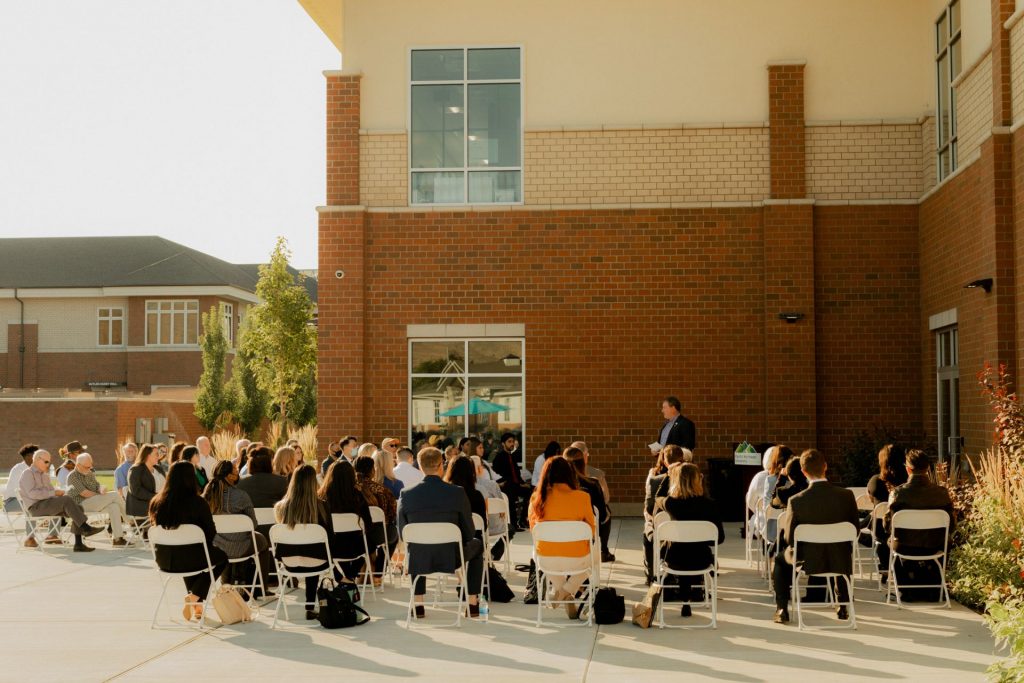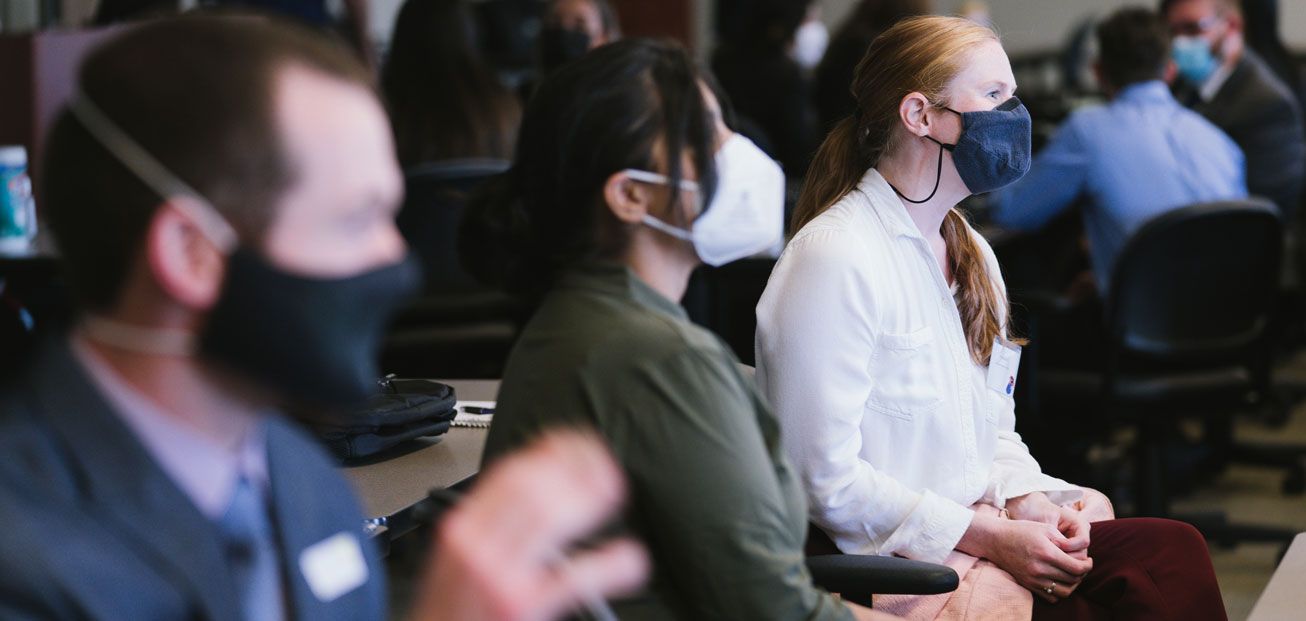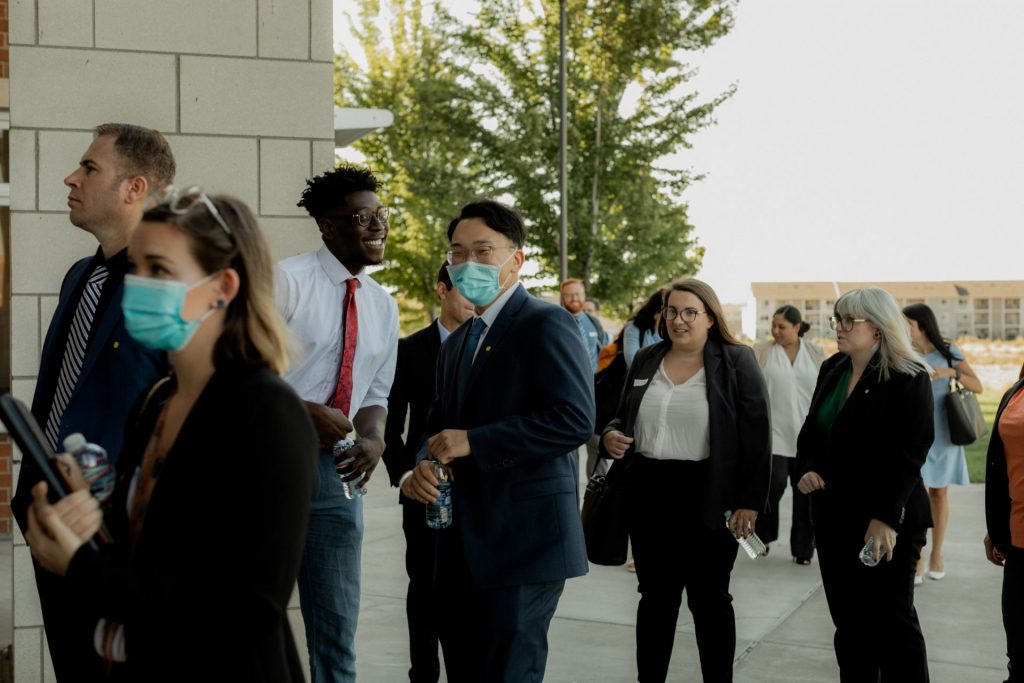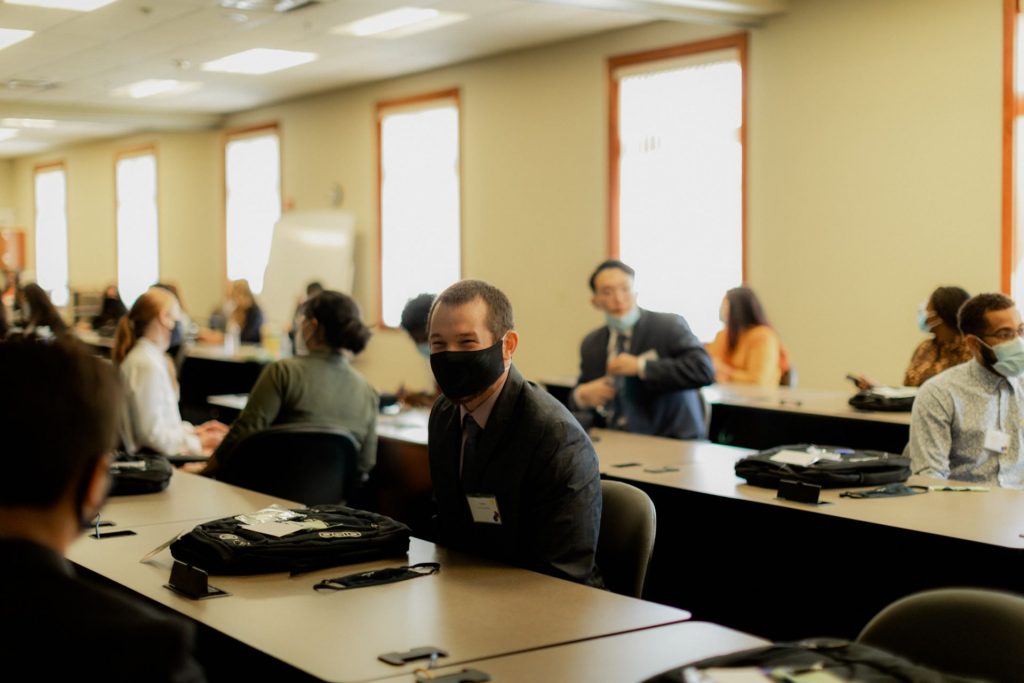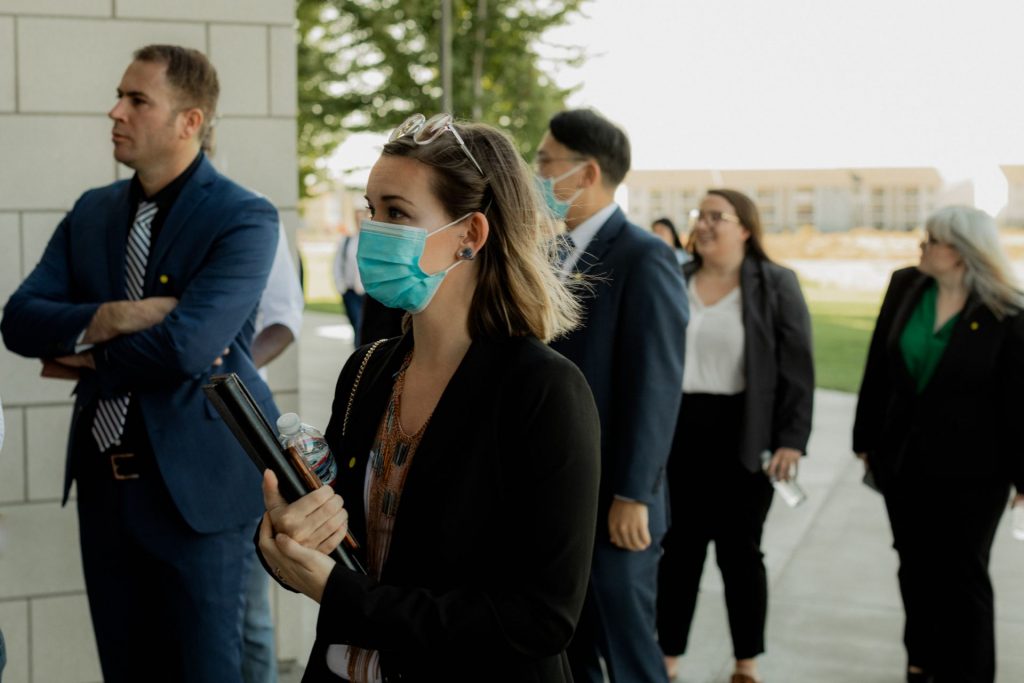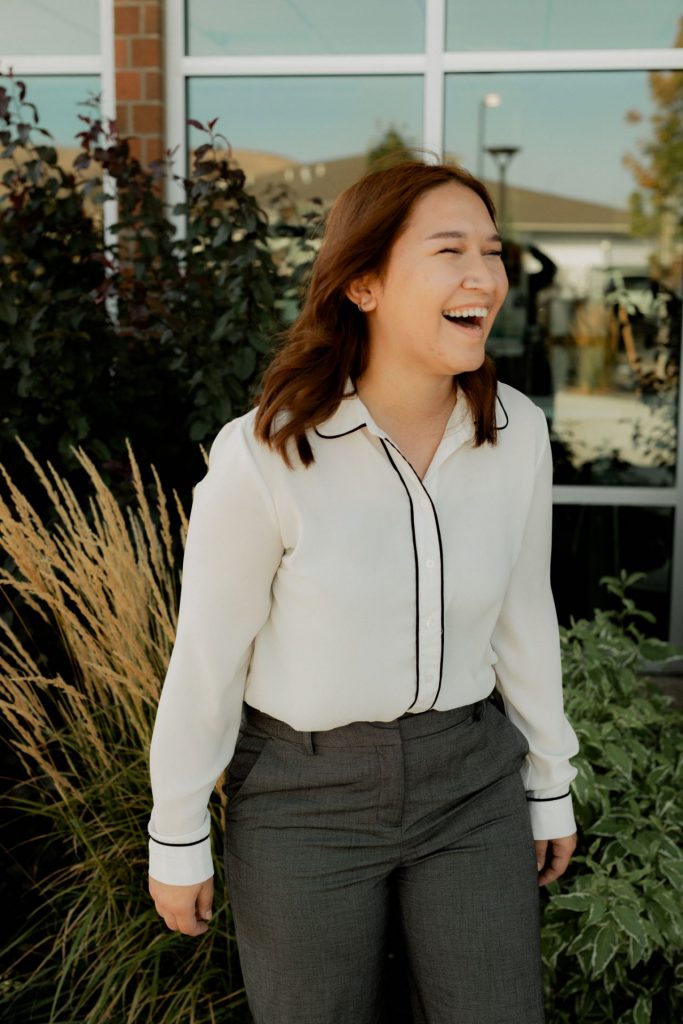PNWU Welcomes Inaugural Master of Arts in Medical Sciences (MAMS) Class
On Monday, August 9, 2021, Pacific Northwest University of Health Sciences’ (PNWU’s) inaugural Master of Arts in Medical Sciences (MAMS) class will begin their studies on the grassroot university’s burgeoning Yakima campus. The one-year master’s degree program will educate around 40 students each year under the university’s mission of improving healthcare access in rural and medically underserved communities throughout the Pacific Northwest.
As 41 new MAMS students begin their studies on a health sciences campus expected to double in size within the next five years, they represent a program which already boasts a rich and accomplished history.
The Influence of Partnership
“MAMS gives anyone who wants to become a healthcare professional the opportunity to make the leap to medical school,” explained PNWU President Dr. Michael Lawler. “With MAMS, we are signaling to the community that there is a place here for you. It is an opening to join us in our mission of ensuring that our loved ones have access to the care they need.”
“With MAMS, we are signaling to the community that there is a place here for you.”
Originally conceived by PNWU’s founders in 2008, the MAMS program has been hosted by Heritage University (HU) since its inception in 2012. As the Pacific Northwest’s newest and only osteopathic medical school at the time, PNWU was not yet regionally accredited to offer the MAMS degree, or any degree other than the Doctor of Osteopathic Medicine degree.
“PNWU was created to bring multiple health sciences programs together under one mission,” explained Dr. Mark Taylor, director of PNWU MAMS, who has been with the university since its foundations, and has served as a professor for MAMS students since the program began. Recognizing the immediate need for a master’s degree program capable of welcoming non-traditional medical students to the mission-driven medical school, Dr. Taylor and other university leaders looked to Heritage University, a predominantly Native American and Hispanic-serving institution, to help incubate the ambitious pathway program.
“Heritage’s mission resonated so deeply with our own,” said Dr. Taylor. “They were working to remove the barriers limiting access to higher education, and we were working to remove the barriers limiting access to healthcare.” Recognizing the potential of combining their mutual efforts, the two universities formed a partnership, and PNWU faculty members began serving as adjunct professors for Heritage’s new MAMS program. “Heritage was vital in moving MAMS forward,” Dr. Taylor explained. “Their influence has enhanced our mission and helped our program to have an even more substantial impact on our communities.”
At HU, MAMS students were typically first generation, minority, late blooming, or disadvantaged individuals. Their courses were taken alongside first-year osteopathic medical students at PNWU, as well as first-year pharmacy students at Washington State University. As the program officially joins PNWU, those interprofessional learning experiences will continue to increase. Paired with standardized exam preparation, service-learning opportunities, mentorship, study strategies, club participation, and access to medical, physician assistant, physical therapy, occupational therapy, nurse practitioner, and pharmacy school faculty/staff/students, MAMS students are able to not only strengthen their medical school applications, but demonstrate their readiness for professional school.
“We’re working to ensure that everybody has a shot at becoming whatever they want to become, and MAMS has expanded our capacity to provide that,” explained Dr. Lawler. “Selfishly,” he added, “it also provides us with direct access to these incredible students, and exposes them to our mission, and our health sciences programs.”
Overseeing a university which seats a class of over 135 osteopathic medical students each year, Dr. Lawler sees MAMS as an opportunity to scout the mission-fulfilling prospects who will go on to positively impact rural and medically underserved communities. “MAMS gives us access to a group of 30-to-40 students each year, all of whom seem to offer these incredible abilities that may otherwise have never been seen,” said Dr. Lawler.
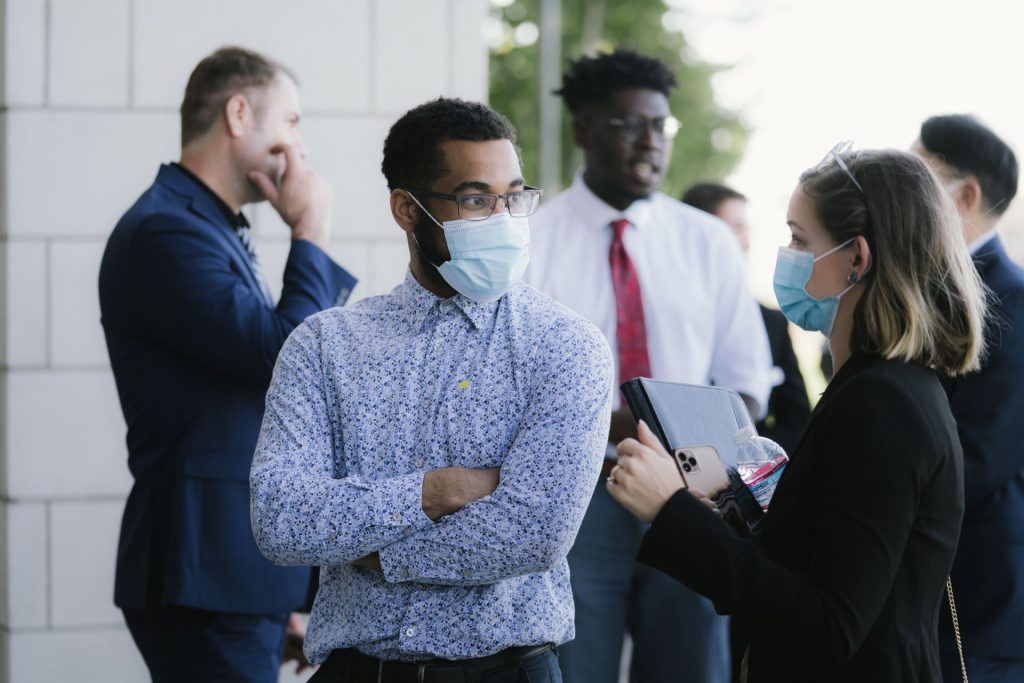
A Rare Opportunity
Under Heritage’s leadership, and as the only graduate degree conferring premedical post-baccalaureate program in the Pacific Northwest, MAMS has celebrated and maintained a 100% graduation rate throughout its history. Approximately 44% of all graduates have represented minority backgrounds, and 92% of those graduates have transitioned on to a health professional school or job of their choice. In just eight years, 225 MAMS students have been admitted to medical, dental, optometry, podiatry, pharmacy, nurse practitioner, and physician assistant schools.
“Representation in health support occupation workers is around 40-to-50%,” explained Dr. Taylor. “At the doctoral level, it’s around 8-to-14%. I’d love to see PNWU MAMS go in that middle zone, where it can really open doors for people.”
While achieving a master’s degree on the way to a doctorate degree is a relatively standard process in many higher education concentrations, a transitional master’s degree isn’t built into the medical school system. For those hoping to explore the many avenues of healthcare education, or trying to strengthen their health science acumen, MAMS offers a rare opportunity.
“Success, not regardless of our backgrounds, but because of our backgrounds.”
“I didn’t have a great MCAT score, and my transcript didn’t reflect my abilities as a student,” explained Priya McBride. Still, her desire to somehow help the medically underserved communities she grew up in burned bright.
One of three adopted children in a family of seven, McBride was raised in the unincorporated Washington community of Holcomb — a town so small that a Google photo search only results in images of Washington Football Team linebacker Cole Holcomb. For McBride, a career in healthcare was within sight, despite the 90-minute ride it took her family to get her to her pediatrician appointments. “I normalized it,” McBride explained of the shortage of healthcare providers around her hometown. “I didn’t know different.”
Despite their remote challenges, McBride’s family always made an adventure of her pediatrician trips, making sure to stop in the state’s capital city of Olympia for lunch along the way. Looking back on it, McBride loved going to the doctors.
After being adopted, McBride arrived in the U.S. with a host of health issues. She was born premature and ended up with Respiratory Syncytial Virus (RSV), a viral illness that can cause trouble breathing and is the most common cause of pneumonia in babies — but her pediatrician showed great care for her throughout her childhood, as did her parents. Inspired by their selfless dedication and kindness, McBride decided early on that she too would help people. As she grew, she discovered a natural love for science, and her path to medicine became obvious. Long before that, however, her romance for long family trips to the doctor had faded.
“Watching my dad deal with complicated health issues like diabetes and sleep apnea, I constantly worried: What if something bad happens? What if something happens and we can’t be where we need to be in time?” said McBride. After graduating from college with a degree in biology she moved home and began working as an emergency room scribe in Aberdeen, WA. There, she saw how overwhelmed the local hospital system was, and how difficult it was for patients to access the care they needed.
She wanted to get more involved in medicine, and had taken the MCAT once, but her score wasn’t great. She applied to one medical school and was rejected. Her transcript just didn’t reflect her abilities. She loved the work she was doing in the ER, but she didn’t know how to grow into it, and after being out of college for almost three years, she was terrified of applying to medical school again – not only because of her lackluster transcript, but because she couldn’t imagine making the seismic leap to an intense medical school curriculum. “I was so nervous of that gap between me and what I thought a medical student should be,” she explained. “How would I jump into something like that?”
Then, a PNWU student named Jessica, who happened to be rotating in the same ER in Aberdeen, mentioned the MAMS program.
She’d struggled with the MCAT herself, she told McBride, before learning about the accessible, preparatory, one-year master’s degree program where students could be a part of a medical school curriculum from day one. It had provided her with an opportunity, she explained, and even made her first year of medical school go smoother. McBride took her advice, and in 2019, graduated with her Master’s in Arts and Medical Sciences from Heritage University. Soon after, she was accepted to PNWU.
Today, McBride is PNWU College of Osteopathic Medicine’s (COM’s) Class of 2024’s Senator of Campus Programming, and a co-mentor for Roots to Wings, a year-long peer mentoring program which pairs Native American and Mexican-American middle and high school students with PNWU medical school students in an effort to deepen PNWU students’ understanding of both Native America and Mexican-American cultures, values and traditions, and to stimulate those very youth to pursue health sciences educations. She is confident that her education is preparing her to one day practice the sort of care she’s always dreamed of providing.
“For me, MAMS was a reassurance,” McBride explained. “If I could do well there, I had a chance. It was the confidence boost I needed, and that is so important. MAMS gives hard-working people a chance to see that they are capable, and PNWU enriches the student body by opening a door to those people.”
Beyond her own aspirations, McBride hopes that PNWU MAMS will encourage other medical schools to adopt similar programs. “The experience it provided me was invaluable,” she said.
“MAMS proved that being a physician wasn’t some far-off fantasy; that It was possible as long as I believed in myself and had somebody to believe in me. I and all of my MAMS classmates have succeeded not regardless of our backgrounds, but because of our backgrounds.”
You Are Welcome Here
As MAMS makes a long-anticipated transition to PNWU, the university’s vision of revolutionizing community health promises to root even deeper into a program that has already produced so many mission-fulfilling graduates. For many of those graduates, PNWU’s mission is more than just words – it is a lifelong pursuit made possible by rare opportunity and astounding perseverance.
“With MAMS, PNWU is able to help more learners, from more communities, realize their dreams of becoming health care professionals,” said Dr. Lawler. As he reflected on the program’s brief but impressive history, he suddenly changed course. “Listen,” he said intently, “if you’re reading this, and you’ve ever dreamed of being in the healthcare field: Come to PNWU. This program is for you. We need you, and you are welcome here.”
After having his medical school application waitlisted by PNWU in 2018, Maxwell Finch recalls hearing similar words from Dr. Taylor.
“I was looking for something meaningful; somewhere I could spend the rest of my life learning,” Finch explained. “The MAMS program was the greatest opportunity I could’ve found.”
Finch’s first job was at a low-income medical clinic in his hometown, where his friend’s mom served as chief. “It was the first time I saw people who were inspired by their work,” he explained. He was hooked immediately; he’d found his calling: he would become a doctor and provide primary care to underserved patients. Everything was so clear, until he wasn’t accepted into PNWU’s DO program. Shattered, he didn’t know where to turn.
He spoke with Dr. Taylor, who encouraged him to join the MAMS program. He took that advice, signing on just two weeks before the semester began. Soon after, he found himself amongst a group of MAMS students striving toward the same goal he was. As he got to know his classmates, and began learning their stories, he knew he’d found the perfect opportunity.
“I felt welcomed,” Finch explained. “As a nervous master’s student just trying to get into the school, it was amazing to find such support, and the sense of community that existed for us at PNWU. MAMS gave me the opportunity to realize my dream.”
“This program will be an important part of our ‘YOU are welcome here’ component,” said Dr. Lawler. “As we build and grow, we will welcome more people to join us in this work, and our communities will be more well represented in the care they receive as a result.”
Becoming the Change
As a child, a visit to the doctor was an appointment for heartbreak for Ratka Galijot, who immigrated from Serbia to Idaho with her parents when she was just four. She spent much of her childhood alone at home, learning English from television shows while her parents worked long hours. As her grasp of the language improved, they requested that she accompany them to their medical appointments.
They never knew what the doctors were saying, they told her, and everyone seemed to grow frustrated with them. They couldn’t keep spending their hard-earned money to only hit a language barrier, and they leaned on their eight-year-old daughter for help.
“I tried, but the frustration was often overwhelming,” recalled, thinking of her early impressions of the medical field. “Nobody took the time with us – it was always in and out – and I was struggling to understand what was going on. I didn’t understand why, every time we went to the doctors, my parents got angry, or left in tears.”
Determined to do something, Galijot would rush home, researching everything she remembered from the appointment. She’d learn all she could, taking notes from her Google searches, and translate the information back to her parents. She credits those experiences for her desire to help others facing similar language barriers, as well as for her love of science. Today, as a second-year osteopathic medical student at PNWU, Galijot credits the MAMS program for providing her the opportunity to combine those passions.
“In MAMS, I was surrounded by classmates connected under the same goal, with the barriers we’d all overcome behind us,” she said. “I didn’t come from a family of physicians — I was an immigrant living with a sponsor family — and I’m going to be a physician. I’m going to help people.”
“The Confidence to Pursue My Dream”
PNWU leaders hope that MAMS will serve as a signal to people in medically underserved communities that there is a place and a need for everyone in healthcare.
“Sometimes it only takes one person believing in you — one ‘you can do this’ – to light the way,” said Dr. Lawler. “Sometimes it takes several steps or experiences to find your right opportunity, and we all benefit by doing all we can to ensure that everybody has a shot at becoming whatever they want to become. MAMS expands our capacity to provide that opportunity.”
“Sometimes it only takes one person believing in you — one ‘you can do this’ – to light the way,”
Ray Aujla knew he wanted to be a doctor when he was a kid, but he also knew that he couldn’t be. He got good grades, and science seemed to come naturally to him, but all of that folded under his hemophobia. “You can’t be a doctor if you’re scared of blood,” he remembered thinking. To avoid that fear, Aujla enrolled in a kinesiology program, hoping to find a place in healthcare that wouldn’t require him to cross any sanguinary scenes. After graduating with a Bachelor of Science in kinesiology, however, he didn’t feel like it was the right path for him.
He returned home and began working at a local YMCA, trying to figure it out what to do next. He knew he still wanted to be in the medical field, but he had no idea how to move forward.
“I didn’t know if I had the right pre-recs, the right skillset – I didn’t know what I was missing,” he explained. After studying on his own, he took the MCAT exam, but struggled. “I wasn’t getting the results I was after, and I knew that applying to medical school was essentially flushing my money down the drain. I needed to make myself more competitive somehow.”
Feeling stuck, Aujla returned to his undergrad institution and spoke with an advisor, who suggested MAMS. He’d never heard of the program, but it sounded like what he needed. He drove to Yakima and met Dr. Taylor and Dave Warner, PNWU’s manager of student and alumni recruitment, who has also been with PNWU since the beginning.
“Honestly, I was scared and nervous when I showed up,” recalls Aujla, “but they welcomed me in, gave me a tour, explained the programs — it was so heartwarming. Their support gave me the confidence to pursue my dream, and that support has never faded. Since my first step on campus, I’ve been surrounded by people who want me to succeed.”
As a MAMS student, Aujla was exposed to a variety of health sciences programs, and witnessed the amazing collaboration opportunities that existed between them. He graduated from Heritage in 2019 and was accepted into PNWU’s Class of 2024. Today, he serves as the president of his classes Student Government Association. He has also managed to overcome his fear of blood.
“MAMS is a living example of second opportunity,” said Aujla. “It gave me a chance to stand up and show myself — this time with a team around me that believed in me and was always pushing me forward. I didn’t know how greatly that support would shape me.”
Ashby’s Rose Garden
As 41 new MAMS students begin their studies at PNWU, the seeds of a community health revolution continue to spread across the university’s Yakima campus.
“My grandmother Ashby had a rose garden,” said Dr. Taylor, illustrating his dreams for the program. “We would tend it together and talk, and one day she made a comment that stuck with me forever. She said: A strong person cares for self, a stronger person cares for others, and the strongest person cares for others as self. Those are the roots of our MAMS program. As its director, I’ll continue working to create an environment where everybody’s unique talents and abilities can come together and be nurtured. Outside of that, I’ll stay out of the way as much as possible and watch the magic continue.”
A strong person cares for self, a stronger person cares for others, and the strongest person cares for others as self.
